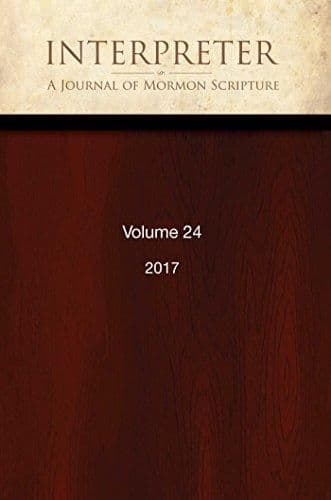Journal
“See That Ye Are Not Lifted Up”: The Name Zoram and Its Paronomastic Pejoration

Title
“See That Ye Are Not Lifted Up”: The Name Zoram and Its Paronomastic Pejoration
Publication Type
Journal Article
Year of Publication
2016
Authors
Bowen, Matthew L. (Primary)
Journal
Interpreter: A Journal of Latter-day Saint Faith and Scholarship
Pagination
109-143
Volume
19
Abstract
The most likely etymology for the name Zoram is a third person singular perfect pōʿal form of the Semitic/Hebrew verb *zrm, with the meaning, “He [God] has poured forth in floods.” However, the name could also have been heard and interpreted as a theophoric –rām name, of which there are many in the biblical Hebrew onomasticon (Ram, Abram, Abiram, Joram/Jehoram, Malchiram, etc., cf. Hiram [Hyrum]/Huram). So analyzed, Zoram would connote something like “the one who is high,” “the one who is exalted” or even “the person of the Exalted One [or high place].” This has important implications for the pejoration of the name Zoram and its gentilic derivative Zoramites in Alma’s and Mormon’s account of the Zoramite apostasy and the attempts made to rectify it in Alma 31–35 (cf. Alma 38–39). The Rameumptom is also described as a high “stand” or “a place for standing, high above the head” (Heb. rām; Alma 31:13) — not unlike the “great and spacious building” (which “stood as it were in the air, high above the earth”; see 1 Nephi 8:26) — which suggests a double wordplay on the name “Zoram” in terms of rām and Rameumptom in Alma 31. Moreover, Alma plays on the idea of Zoramites as those being “high” or “lifted up” when counseling his son Shiblon to avoid being like the Zoramites and replicating the mistakes of his brother Corianton (Alma 38:3-5, 11-14). Mormon, perhaps influenced by the Zoramite apostasy and the magnitude of its effects, may have incorporated further pejorative wordplay on the Zoram-derived names Cezoram and Seezoram in order to emphasize that the Nephites had become lifted up in pride like the Zoramites during the judgeships of those judges. The Zoramites and their apostasy represent a type of Latter-day Gentile pride and apostasy, which Nephi, Mormon, and Moroni took great pains to warn against.
Subject Keywords
Bibliographic Citation
Terms of use
Items in the BMC Archive are made publicly available for non-commercial, private use. Inclusion within the BMC Archive does not imply endorsement. Items do not represent the official views of The Church of Jesus Christ of Latter-day Saints or of Book of Mormon Central.